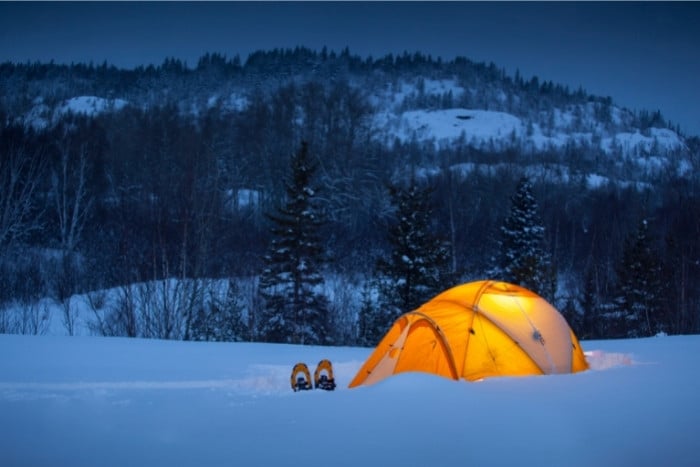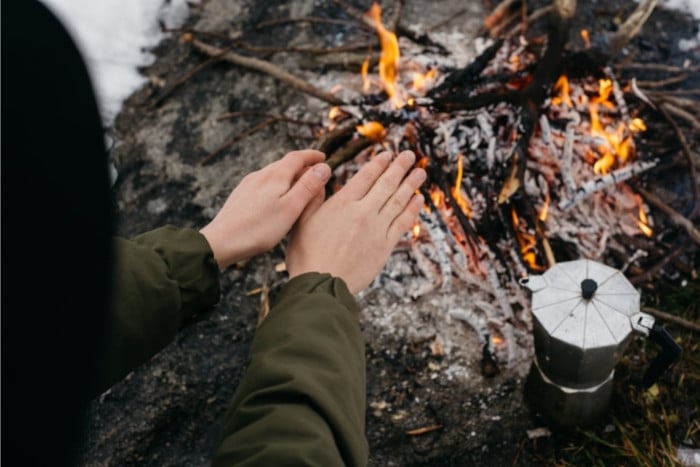Why would anyone use a tent in winter? Those look super thin, right? Trying to survive winter in a tent can be dangerous IF you don’t know what you’re doing. However, with the right equipment, the best tips and tricks, and excellent mental fortitude, you, too, can do it.
Surviving winter in a tent is achievable if you take the proper measures, such as: having an insulated tent, bringing the right gear, getting enough calories daily, and more. It’s crucial to understand that it’s a more demanding experience and requires you to take more gear and consume more energy.
If you’re about to go winter camping and wondering whether you can live in a tent in the winter, continue reading.
Tips and Tricks for Surviving Winter in a Tent
Winter camping is a great way to escape the city life’s hustle and bustle.
The thrill of waking up to snow falling through the trees and hearing the wind whistling around your tent is enough to put anyone in a good mood.
If you’re wondering, can you live in a tent in the winter? Then the short answer is yes. However, to do that properly and without risking your life, you must be prepared.
We’ve prepared some of the best tips and tricks for surviving winter in a tent.
1. Insulate Your Tent Properly
The first thing you should do when preparing for winter camping is to insulate your tent properly. This will help keep you warm during those cold nights.
Also, you must do a complete inspection of the tent before going out camping. If there’s even the slightest tear or hole in your tent, it will have a big impact on your experience.
It’ll mean that you’ll constantly lose the heat that is so needed, especially at night. Make sure to have tent patches handy to seal up any holes you may find while out in the wilderness.

2. Bring Enough Food
Winter camping means spending long hours outside, so you’ll need to bring plenty of food to keep up with the number of calories you’ll be burning.
Our body is smart, and to keep itself as healthy as possible during winter, it has to burn more energy. Make sure you pack enough food for at least one or two more days than the planned trip.
Also, include snacks like nuts, dried fruits, and granola bars. These are easy to carry and won’t weigh down your backpack.
They also provide high amounts of nutrients and protein in small packages. If you can get yourself some protein bars, that would also be beneficial.
3. Pack Warm Clothing
When packing clothes for winter camping, you should consider wearing layers. For example, wear a t-shirt under a sweater and another layer on top of that.
This way, you’ll stay warmer inside without having to worry a lot about sweating. Usually, we recommend that you get sweatshirts made from high-quality materials that will help you retain body heat.
Another extra thing you can do is get heated jackets. If you’re going to a place where you think you need this, I recommend it. However, remember to charge them before going out.
4. Carry Extra Gear
When going camping in the winter, you’ll need extra gear. You’ll need extra sweatshirts, t-shirts, and everything else you will wear when hiking outside in harsh weather.
The main reason is that you don’t want to sleep in your sweaty layers, which would be uncomfortable and potentially fatal.
Make sure you pack everything you need, even though your backpack might weigh more than usual.
It’s better to endure more weight than to curse yourself for not packing enough stuff to help you survive in your tent during the winter.
Don’t forget to pack a sleeping bag liner, a rain poncho, a flashlight, a hat, gloves, and boots.
5. Prepare Your Campfire
Campfires are essential for survival in the wilderness, especially on a cold winter night. They provide warmth, light, and the ability to cook your food.
When planning your campfire, make sure you prepare everything correctly. You should use a pre-existing fire pit if there is one. Otherwise, build a proper fire pit.
Next, you should add dry kindling and wood and have enough logs gathered to sustain the fire. Finally, you should place a metal grate over the fire pit.
You can even put it close to your tent to provide heat, but be careful since tents are flammable.
6. Keep Yourself Hydrated
Water is one of the most important things you need to survive winter camping. Therefore, make sure you drink water frequently. You should also avoid drinking alcohol or caffeinated beverages.
Even though alcohol might seem like a good idea at first because of the kick you get, it’s one of the worst things you can do when camping.
Drinking alcohol and alcoholic beverages in the cold can increase the risk of hypothermia, dehydration, and injury.
7. Avoid Hypothermia
Hypothermia is caused by exposure to low temperatures for a long period. As soon as you feel yourself starting to shiver, you should immediately seek shelter. Otherwise, you could end up dying.
Yes, you read that correctly; you can die from it. To prevent hypothermia and to survive winter camping, you need to get out of the rain or snow as soon as possible.
Set up the tent, add the many layers of clothing and padding, and start eating carbohydrates.
At this point, your body is telling you that it needs energy so try to eat as much as possible, and don’t forget to drink water.

8. Bring in an Extra Sleeping Pad
Having two sleeping pads is going to be better than just one. This is especially true if you’re staying in a tent in winter.
Since tents aren’t designed to withstand extreme temperature changes, not all come equipped with padding on the bottom.
Where you’re going to sleep is important, and it will make or break your winter camping trip. We recommend you take an extra sleeping pad and double up.
This will provide double the protection from the cold ground and make your sleep more comfortable.
9. Use a Hot Water Bottle to Keep you Warm
In some cultures having a warm water bottle between their legs is considered normal in the winter months.
You can also adopt this method, and I can guarantee that it will make a big difference in your sleeping experience and dealing with the cold.
If you’ve got a campfire going, you can easily have warm water in the wild. One thing you have to keep in mind, though, is to not place the water bottle on your feet which is what most people suggest.
You need to place it on your stomach or between your legs. This warms the blood fast and flows to all the extremities.
10. Don’t Forget Your Accessories
Headgear is very important when you’re camping in the winter. It’s going to protect your head from getting frostbite, and it’s going to help you stay warm.
The best type of headgear is balaclavas, but if you can’t find any, you can use scarves and put them around your neck and head.
You can face the cold without fear with a little extra help from technology. Even though you won’t be able to bring a space heater, you can bring some additional accessories to help.
These include hand warmers, heated gloves, heated boots, and more. These are great because they’ll help you stay warm on the inside, even if you’re outside, braving the cold.
Closing Thoughts
Winter camping is not easy, but there are ways to deal with it. If you follow the tips above, you’re going to be fine.
Always wear multiple layers of clothing, and never underestimate how cold it can get in the winter. It’s better to be over-prepared than suffer the cold’s catastrophic consequences.
I hope this article helped you get the information you were looking for. If you have any questions or suggestions, don’t hesitate to reach out to us.
